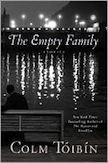All a Novelist Needs: Colm Tóibín on Henry James
Edited by Susan M. Griffin
Johns Hopkins. 148 pages, $25.
 The Empty Family
The Empty Family
by Colm Tóibín
Simon & Schuster. 275 pages, $24.
A FEW YEARS AGO Henry James appeared in the novels of three contemporary gay writers. In the most tenuous of these connections, Alan Hollinghurst’s The Line of Beauty, the protagonist is doing research for a doctoral thesis on James. In Edmund White’s Hotel de Dream, James is a prissy prude who intervenes in the career of Stephen Crane. In Colm Tóibín’s The Master, he is a lonely, closeted homosexual near the end of his life.
When I first heard that Tóibín had written a novel about Henry James, I wondered why. We already had five volumes of the Leon Edel biography. What could fiction add to fact? The answer was a portrait of loneliness. This was an audacious thing to do; there was a certain chutzpah about The Master. Now comes All a Novelist Needs, a collection of book reviews and essays by Tóibín that reflects his deep immersion in the considerable literature by and about James. Here we learn, for instance, that one reason Tóibín wrote his novel was to correct what he considered an unfair charge against James in Lyndall Gordon’s A Private Life—along with Edel’s, the best book about James, in Tóibín’s opinion, but one that deals unfairly, he maintains, with James’ relationship with his cousin Minnie Templeton and friend Constance Fenimore Woolson. (Gordon thinks James exploited them; Tóibín does not.) Another inspiration for The Master, we discover, was more personal: the experience of losing the Man Booker Prize when his novel The Blackship Lighthouse was nominated made Tóibín think of James the night he was booed onstage at the premiere of his play Guy Domville.






